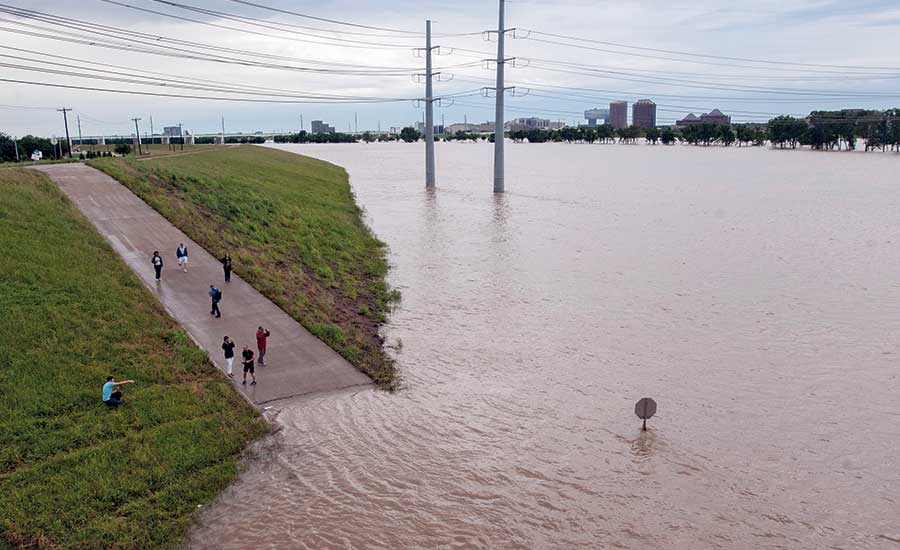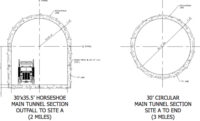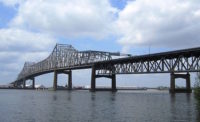Project Delivery
Why Dallas Called for Do-Over On Big Drainage Tunnel Project
An audit followed disqualification of Odebrecht Construction's low bid on Trinity River watershed job

Flood Control The Trinity River regularly overflows its banks, as shown in this May 2015 photo, and storm drainage in the river’s watershed area in East Dallas also has proved to be a recurring problem. AP Photo/Rex C. Curry
After discarding both the low and second-low bids, the city of Dallas has decided to start over with a competition for a big drainage-tunnel prime contract in the Trinity River watershed in the east section of the city.
The Dallas City Council on June 15 voted 13-2 to solicit new bids, rejecting plans by city officials to award the tunnel project to Southland Mole, a joint venture formed by Mole Constructors Inc. and a related company, Southland Holdings LLC, Roanoke, Texas. Southland Mole was second low, at $209,537,742, when competitors submitted bids in December.
Following heavy rains, streets flooded to depths as great as 10 ft in 1995, 2006 and 2007. The planned 5-mile-long Mill Creek-Peaks Branch-State Thomas Drainage Relief Tunnel will be made of concrete and be 70 ft to 150 ft deep, with an excavated diameter of 32.5 ft.
The decision to start a new round of bidding came after a report by the city auditor, alleging that Dallas officials had failed to conduct a proper review process. Odebrecht Construction Inc., the U.S. subsidiary of Brazilian tunnel giant Odebrecht, had been the low bidder on the contract, at $189,246,994.
City officials initially designated Odebrecht Construction’s bid as non- responsive because of unspecified errors in its bid, including a line item that “did not total,” according to city records. After a meeting with company officials, the city’s project consultants deemed Odebrecht responsive. But Dallas’ consultants on March 14 found Odebrecht Construction’s low bid to be “non-responsible,” as opposed to “non-responsive,” due to a “lack of tunnel experience.”
Odebrecht Construction appears to have lost the bid at least partly because the Dallas consulting team or city officials declined to accept the company’s tunneling projects from different parts of the world as part of the bidding entity’s portfolio of completed projects. According to a presentation by the city’s Trinity Watershed Management project staff, the city’s consultants asked Odebrecht Construction after the company’s low bid to clarify “several items in the bid, including the company’s business structure.”
Odebrecht Construction responded by saying the company “operates as its own independent business with its own officers and board of directors” and that Odebrecht officials stated there was “clear separation and independence of management,” as city officials wrote in their evaluation.
A spokeswoman for Odebrecht Construction declined to discuss the matter.
Then, the city decided to move forward with Southland Mole as the apparent low bidder, and city staff and consultants conducted more research. The city project team prepared to take its recommendation to the City Council, but, on April 13, the City Council requested an audit of the contract award process.
Short-Lived Victory
Southland Mole’s apparent victory was short-lived. The auditor’s report faulted the staff of Trinity Watershed Management and its consultants for inconsistencies in follow-up evaluations of the tunnel bidders and for failing to document parts of its review of Southland Mole’s qualifications. But the city’s project team replied in detailed rebuttals to all the audit’s criticisms, asserting that the team had reviewed everything, including Southland Mole’s safety and insurance data.
Now, Southland Mole finds itself back at square one. Undaunted, the company says it plans to compete again for the drainage-tunnel project in the coming months.
“We are obviously disappointed, but we feel like we are in a good position moving forward,” said Tim Winn, a director of Southland Holdings. “We met all the qualifications.”
One of the tunnel’s purposes is to stop deadly flooding that, in the past 21 years, has cost 13 lives and inflicted damage on Baylor University Medical Center, schools, commercial properties and homes.
“It’s a serious project, and it’s needed for sure,” Winn said.





